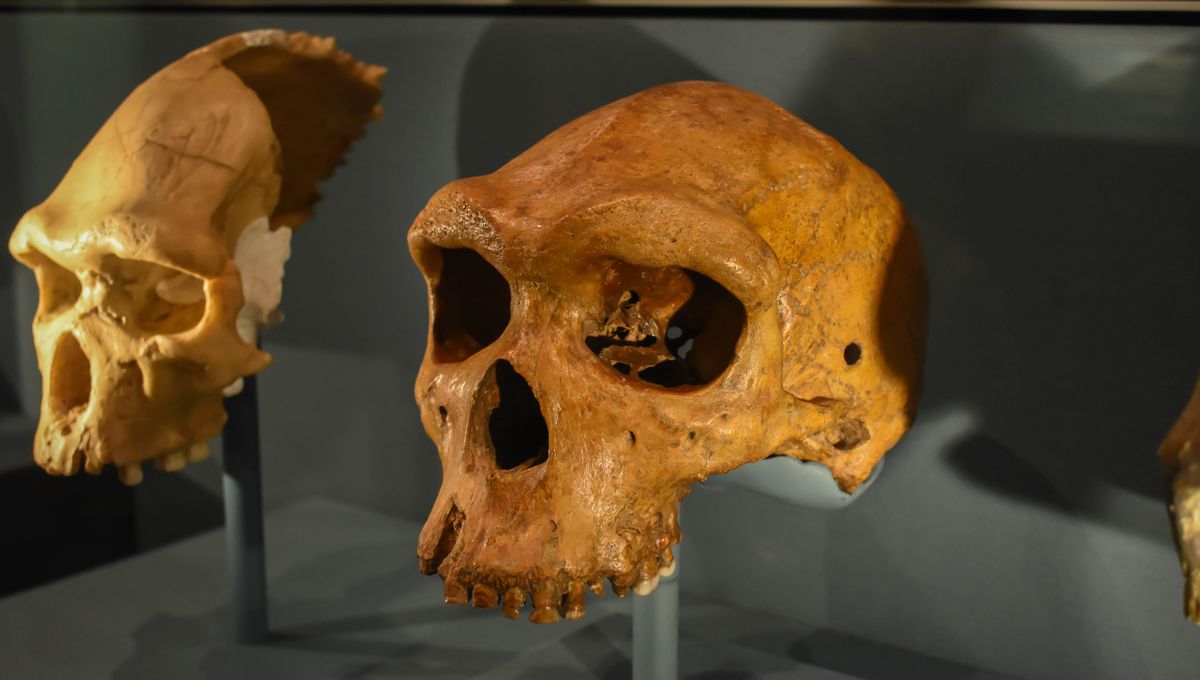
On Earth today, there is only one species of humans. Us. Homo sapiens to use our scientific term. But this was not always the case – multiple species of humans existed at the same time for most of the last several hundred thousand years. Then, they all disappeared, leaving us as the only extant member of the Homo genus on the planet.
Palaeontologists have been trying to work out what exactly happened, and if our ancestors are at fault. If we turn back the clock to when Homo sapiens is believed to have evolved – around 300,000 years ago – we will find that there were a lot of other human species around.
I wish I could give you a straightforward answer.
Professor Chris Stringer
The Neanderthals are probably the most famous of this bunch, but at roughly the same time there were the Denisovans, Homo heidelbergensis, Homo naledi, and Homo erectus, as well as diminutive species of humans on the island of Flores, Homo floresiensis, usually referred to as “the Hobbits”. There is some fossil evidence for more species, but the lack of DNA from many of those fragments doesn’t allow for a complete confirmation of other species present at the time.
At least seven human species lived at the same time, for tens of thousands of years. Our ancestors began to move out of Africa around 60,000 years ago and these migrations coincided with the other species vanishing. Were we responsible for their extinction? Why are we the only ones that cheated oblivion?
“I wish I could give you a straightforward answer. We don’t frankly know why we’re the only ones left. Obviously, some of them may have disappeared before we spread around the world, but we know that within the last 100,000 years, Homo sapiens, having evolved in Africa, started to come out from Africa,” Professor Chris Stringer, human evolution research lead at the Natural History Museum, told IFLScience in our podcast The Big Questions.
This migration out of Africa brought our ancestors in contact with other humans, meeting Neanderthals in Europe, Denisovans in Asia, and the other possible species spread around the world.
“Now all of those species that were there less than 100,000 years ago disappeared somehow in that period, so it’s easy to make a connection with the spread of our species and the disappearance of the other species. Some people make a direct connection, and they say: ‘We just killed them all off, that’s easy. We were very superior to them, and they were out-competed, and they died out very quickly.’ In fact, the more we know about this time, the more complicated it looks,” said Stringer.
Of the other species, the one we know the most of is the Neanderthals. Humans shared territories and even mated with them for thousands of years. There’s also evidence that they had already experienced changes in climate and other shocks, that might have put them on a decline. Professor Stringer stressed that we now know that we were not particularly superior to the Neanderthals. They were a capable species. However, we potentially out-competed them for resources when they were struggling, leading to their disappearance.
In a sense, the Neanderthals haven’t gone fully extinct because a bit of them lives on in us.
Professor Chris Stringer
As for the other human species, Stringer said: “We don’t know why the Denisovans died out, but we know that within a few thousand years of Homo sapiens getting to that region of Siberia, they disappeared. Again, you can make this potential connection. [H. Floresiensis], we don’t know what happened to it, and [H. erectus], we don’t know what happened to it. By extrapolation, perhaps the same process has happened to those as well, but we’ve got much less data.”
There is, however, an argument to be made that maybe the Neanderthals have not completely gone extinct. There was interbreeding between Homo sapiens and Neanderthals, between us and Denisovans, and between Neanderthals and Denisovans. We could almost say they disappeared into our gene pool.
“In a sense, the Neanderthals haven’t gone fully extinct because a bit of them lives on in us. Someone calculated that because we don’t all have the same bits of Neanderthal DNA, if you add up all the Neanderthal DNA in the world today in everyone, you could probably reconstruct 40% of the Neanderthal genome without even having a Neanderthal just from the people alive today,” Stringer explained.
The full conversation is available on all your favorite podcast apps: Apple Podcasts, Spotify, Podbean, Amazon Music, and more.
Source Link: Why Are We The Only Surviving Human Species?